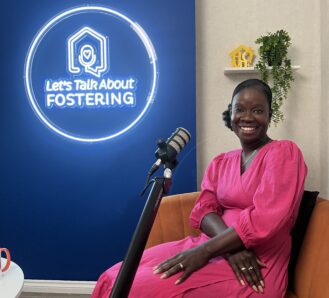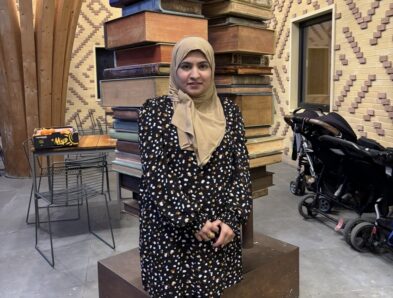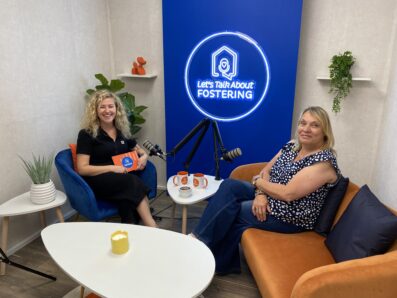If you want to learn more about a fostering panel – what it is and why it’s necessary – you’re in the right place. Join us as we explore how a fostering panel operates, including who sits on the panel, the types of questions you may be asked, and how a recommendation is made.
What is a fostering panel?
A fostering panel is one of the last stages of the fostering assessment process. It’s where all the hard work you and your assessing social worker have done to complete your Form F assessment comes together and is reviewed by an independent panel of fostering experts.
Panel members will review your Form F a few days before the meeting and inform us of any details that need clarification. They’ll also note any questions or additional information they may need. This will help them make a recommendation about your suitability to foster.
During the meeting, the panel may ask you some questions or request additional information to help them reach a recommendation. Once they’ve made their recommendation, the Agency Decision Maker will make the final decision on whether to approve you as a foster parent.

Who sits on a fostering panel?
The purpose of an independent fostering panel is to ensure foster parents are recruited safely. In England, fostering panels must have at least one independent member, which means someone who is not connected with the fostering agency. However, panels typically include more than one independent member to ensure their recommendations are impartial and that a wide range of perspectives are considered.
To become a panel member, individuals must undergo background checks and attend training before being added to a central list. This list includes people with diverse experiences, such as care leavers, experienced foster parents, and fostering professionals. When your panel date is arranged, a selection of members from the central list will be invited to attend.
The fostering panel is typically made up of five to seven people with experience in fostering and may include:
- The Chair, who leads the meeting. They must be independent of the fostering agency.
- The Vice-Chair, who will chair the meeting if the Chair is unavailable.
- Independent members, who could be care leavers, experienced foster parents or fostering professionals with backgrounds in health, education, or other relevant professions.
- Social workers, who must have at least three years of relevant experience in fostering.
An advisor to the panel will be present, and all panel members will have an opportunity to ask questions while an administrator takes minutes. However, it is very controlled, so there aren’t usually lots of questions.
Many fostering panels now take place online through Teams. However, whether you attend a face-to-face or virtual panel meeting, your assessing social worker will be by your side. You can also bring a friend or relative along for support. Although a few people will be in the meeting, they’ll be welcoming, friendly, and supportive throughout.
Fostering panel questions
People are often concerned about the types of questions the fostering panel will ask, but panel isn’t an interview, and many foster parents describe it as more of a friendly discussion. The important thing to remember is that panel questions are not designed to catch you out – they are meant to clarify the information provided in your Form F assessment and help panel members understand who you are and why you want to foster.
The panel may ask you some standard questions, such as how you found your assessment and your training. They’ll also ask you questions created by children living in foster care, to encourage you to think from their perspective. If you are fostering while caring for your own children, they may also want to ensure you’ve considered the impact fostering could have on your family dynamics. These questions not only help the panel make a recommendation but also give you an opportunity to reflect on the challenges you may face.
What happens after fostering panel?
After you’ve attended your panel meeting, the panel will consider your Form F assessment alongside the answers you provided to any questions they asked before making a recommendation.
The panel can make one of three recommendations: a positive recommendation, a deferred recommendation until they’ve received further information, or a negative recommendation.
Don’t worry – the vast majority of recommendations are positive because you’ll only attend the panel when your supervising social worker believes you are ready.
The recommendation is then referred to the Agency Decision Maker, who’ll review all the perspectives of the panel, evidence, and the meeting minutes before making the final decision on whether to approve you as a foster parent.
How is a recommendation made?
Once the panel has made their recommendation, the Chair will sign off the meeting minutes before referring them to the Agency Decision Maker (ADM). The ADM has seven days from the date they receive the minutes to finalise their decision and confirm your approval.
What to wear to foster panel
The fostering panel aren’t there to judge your choice of clothing; they’re there to understand who you are, why you want to foster and whether you can provide young people with a safe, stable, and nurturing environment to thrive.
However, you’ll be meeting various fostering professionals, and wearing smart-casual clothing will not only create a good impression but will also help you feel more confident.

Good Luck
Your assessing social worker will work closely with you, ensuring you only attend the fostering panel when you’re fully prepared and ready to begin fostering.
Remember: Panel members have a professional job to do, but they aren’t there to trip you up or make your life difficult. Many of our foster parents find the idea of panel daunting but everyone is there to help and to make the experience as comfortable as possible for you.
At FCA, we look forward to working with newly approved foster parents. We’re here to support you as you move forward on your fostering journey and begin caring for children who need your love and support.
We’d love to hear from you
If you’re considering becoming a foster parent and have any questions about attending the fostering panel, please get in touch. Our friendly team will be happy to address your concerns and support you as you begin this exciting new chapter.





